Choosing the right marketing data platform is critical for teams managing complex, multi-channel campaigns. While Adverity is a well-known solution for data integration and reporting, it’s not the only option—especially for organizations with evolving data needs, custom reporting requirements, or tighter control over infrastructure and cost.
This article provides a detailed comparison of the key Adverity alternatives and competitors, covering key capabilities, pricing structures, integrations, and scalability.
Why Seek Adverity Alternatives?
Here are the key limitations and comparative weaknesses that make companies consider Adverity competitors:
Adverity Overview
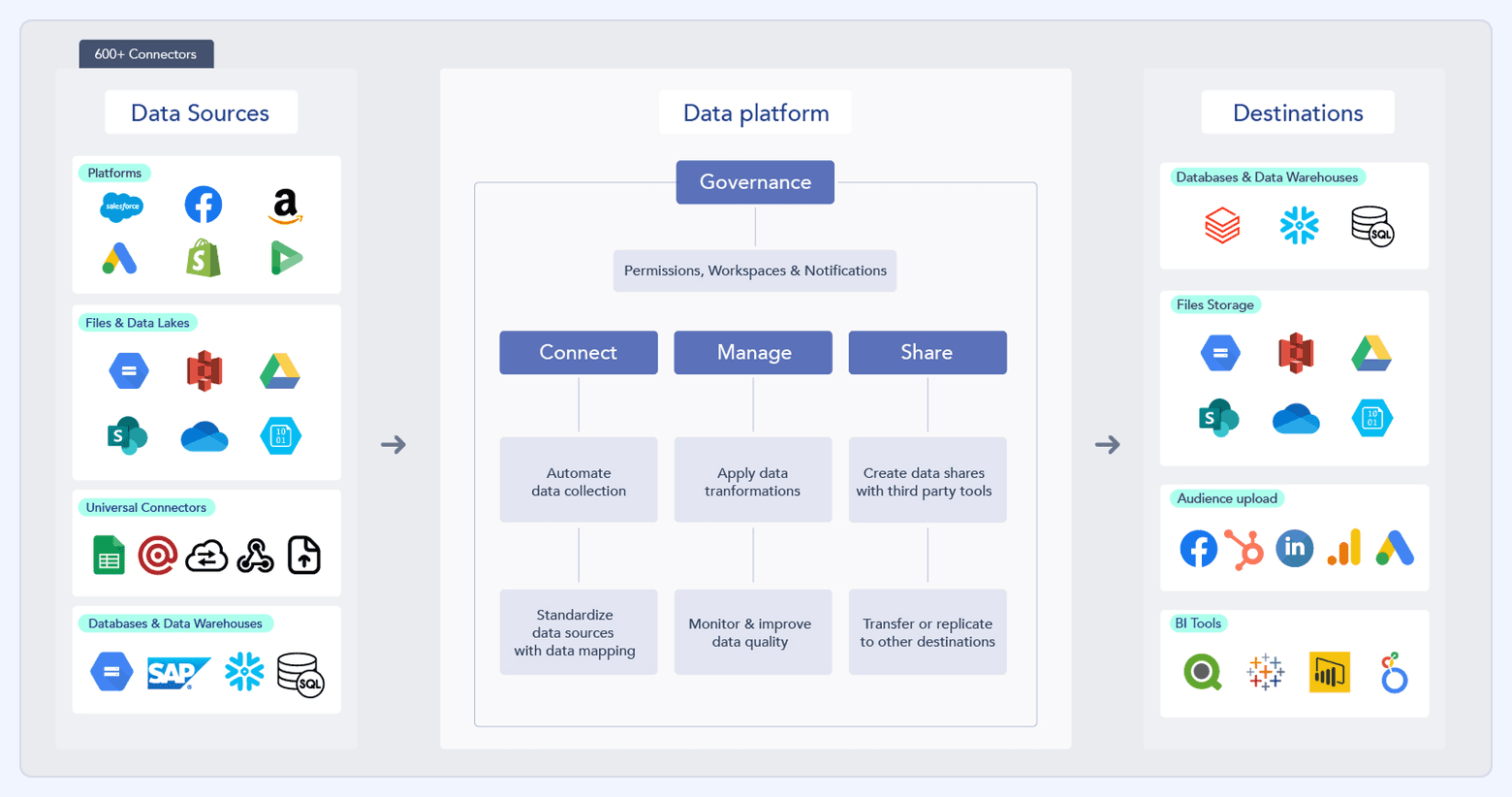
Adverity is a comprehensive data integration and analytics platform designed to streamline the collection, transformation, and governance of data at scale. It enables businesses to consolidate disparate datasets—such as sales, finance, marketing, and advertising—into a unified source of truth, facilitating more informed decision-making.
Key features:
- Data integration: Adverity offers over 600 pre-built data connectors. This allows it to pull data from virtually any marketing, sales, or analytics platform without coding. It also supports databases, file uploads, and custom API connectors for any sources not already covered. Data can likewise be sent to a wide range of destinations (data warehouses, lakes, BI tools, etc.).
- Data transformation: The platform provides transformation tools that can clean, join, and enrich data from multiple sources. It provides a user-friendly no-code interface with pre-built transformation templates (for tasks like currency conversion and taxonomy mapping) and options for custom scripting in SQL or Python for complex transformations. Recently, Adverity introduced an AI Transformation Copilot that can generate transformation code based on plain English instructions.
- Reporting: Adverity includes built-in data visualization and dashboarding which allows users to create interactive dashboards and reports. These dashboards support custom KPIs, cross-channel performance views, and drill-down analysis. Adverity also provides many pre-built report templates and integrates with tools like Tableau, Power BI, or Looker Studio.
- Data quality management: Adverity Data Quality Suite enables teams to monitor, detect and resolve data quality issues at scale.
- Marketing automation: Data refreshes and loads can be scheduled so that reports are always up-to-date, eliminating manual exports. Also, Adverity allows the creation of multiple workspaces to organize data by teams, clients, or regions.
Adverity pricing
Adverity has custom pricing based on factors such as the number of data sources, data destinations, and desired features.
New users can start with a 14-day free trial, which includes all the features of the Standard plan but with a limited data row allowance. After the trial, options include upgrading to the Standard or Professional plans, or discussing a custom plan for larger teams needing additional resources.
Improvado
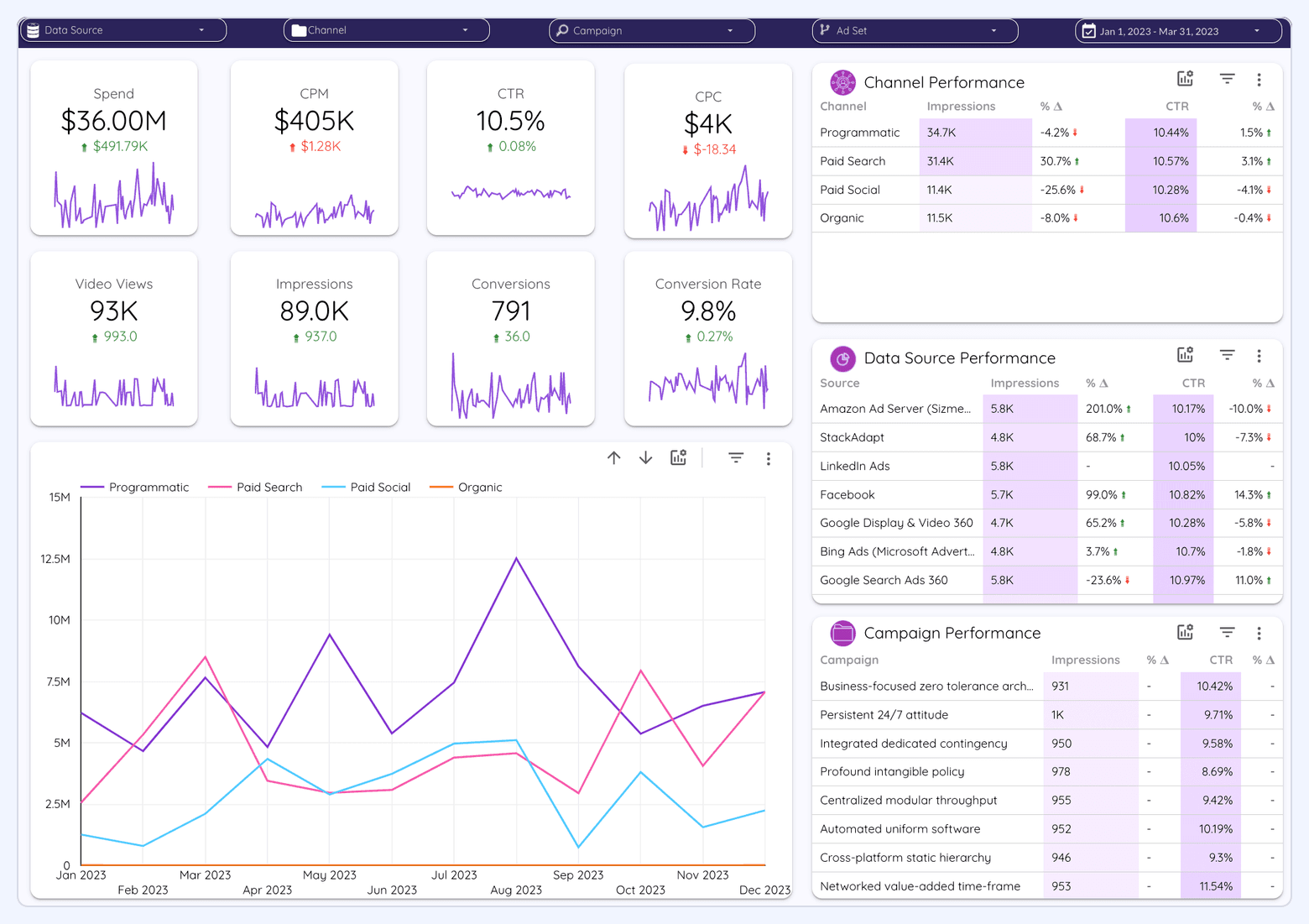
Improvado is the best Supermetrics alternative, offering an enterprise-grade marketing analytics and intelligence platform powered by a robust Extract, Transform, Load (ETL) solution.
How Improvado Solves Adverity's Limitations
The core Improvado functionality:
- Data integration: Improvado supports automated data extraction from over 500 marketing and sales platforms, including Google Ads, Facebook, LinkedIn, and HubSpot. Clients can also request custom data connectors or metrics, which will be delivered in 2-4 weeks. Improvado offers pre-built and custom data extraction templates to further simplify the process.
- Data transformation: Improvado offers an advanced transformation framework, including AI mapping in one click, blending, grouping and joining data together as part of a unified recipe. The platform also provides multiple pre-built models (for example, Cross-Channel, Paid Media Reporting, Paid Social, Paid Search, SEO) that can be implemented with just a few clicks.
- Data warehousing: Improvado provides options to store data in its managed data warehouse or integrate with your existing storage and run transformations and analysis in your DWH. This flexibility ensures that organizations maintain control over their data infrastructure while benefiting from Improvado's capabilities with no data moved or replicated outside your environment.
- Dashboards and reporting: Improvado integrates with any data visualization and BI tool. For on-the-go analysis, it provides a number of pre-built dashboards.
- Data quality management and custom alerts: Improvado offers a robust solution for campaign performance and data compliance, Marketing Data Governance. Marketers can set custom rules or choose from a library of 250+ pre-built rules your campaign should follow. Marketing Data Governance monitors compliance in real time and alerts of any data issues and metrics drops.
- Professional services: Each Improvado pricing package includes customization credits and professional services to tailor the platform to specific business requirements. For example, clients can request custom data sources, metrics, data models, or assistance with dashboard setup.
Improvado pricing
Improvado offers three pricing plans designed to accommodate businesses with different data volumes and needs. Contact Improvado sales to discuss your data requirements and business objectives and receive a customized quote.
Here are key aspects of the Improvado pricing model:
- Each pricing tier specifies clear data volume limits, ranging from up to 200 million unique rows annually in the Growth plan to unlimited data in the Enterprise plan.
- Improvado provides access to its full library of 500+ data connectors and allows an unlimited number of accounts per data source across all plans.
- Every plan includes built-in customization credits that can be used for tailored API connections, custom data transformations, or report configurations.
- All plans include access to Improvado's professional services, including onboarding support, data mapping assistance, and technical consultations, ensuring users can get up and running quickly.
Improvado transformed our approach to marketing analytics. Its automation capabilities and AI-driven insights allowed us to focus on optimization and strategy, without the need for manual data management.
Waleed Noury
Lead Analytics Engineer
Activision
Switching from Adverity to Improvado
Transitioning to a new marketing data platform doesn't have to be disruptive. Improvado's migration process is designed to minimize downtime and preserve your existing data infrastructure.
Stitch
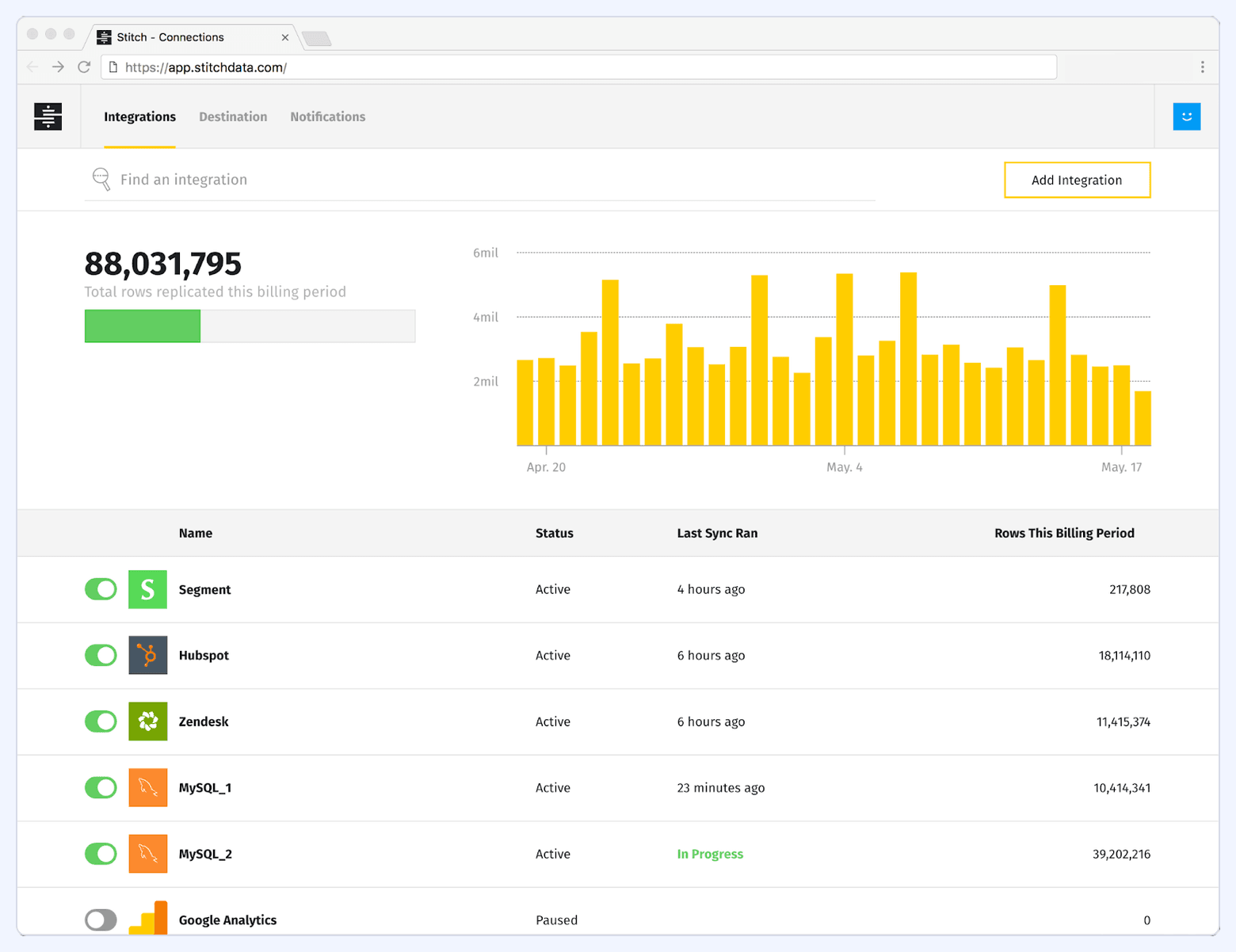
Stitch is a developer-friendly Adverity alternative. It is a cloud-first ETL platform focused on automated data movement from multiple sources into cloud data warehouses. It caters to teams with technical resources that want to build and control their own analytics infrastructure without being locked into a larger, all-in-one marketing suite.
Key features:
- Data aggregation: Stitch supports over 140 data sources, including SaaS platforms, databases, and cloud services. Popular connectors include Salesforce, Google Analytics, Google Ads, Facebook Ads, HubSpot, and PostgreSQL. Source connectors are modular and built on Singer, an open-source standard.
- Data extraction and scheduling: Stitch allows users to schedule data syncs in increments as low as every 5 minutes, depending on plan. Data pipelines can be configured and monitored easily through the UI or API.
- Data transformation: While Stitch follows an ELT model (transformations are performed after loading into a warehouse), it supports integration with tools like dbt for in-warehouse transformations and modeling.
- Destination flexibility: Stitch supports major cloud data warehouses including Snowflake, Google BigQuery, Amazon Redshift, Microsoft Azure Synapse, and more.
- Schema management: Automatic schema detection and change propagation helps ensure that data remains usable and consistent across syncs. Users are alerted to schema drift or source structure changes.
- Pipeline monitoring and logging: Stitch provides detailed logs, sync status dashboards, and alerts for errors or failures. Users can drill into job-level logs for debugging and data quality assurance.
Stitch pricing
Stitch offers three pricing tiers based on data volume and feature access.
- The Standard plan starts at $100/month for smaller pipelines with limited sources and users.
- The Advanced and Premium plans, starting at $1,250/month and $2,500/month respectively, support higher row volumes, more destinations, unlimited users, and access to enterprise data sources.
All plans include key features like scheduling, post-load webhooks, and Connect API access. A 14-day free trial is available.
Domo
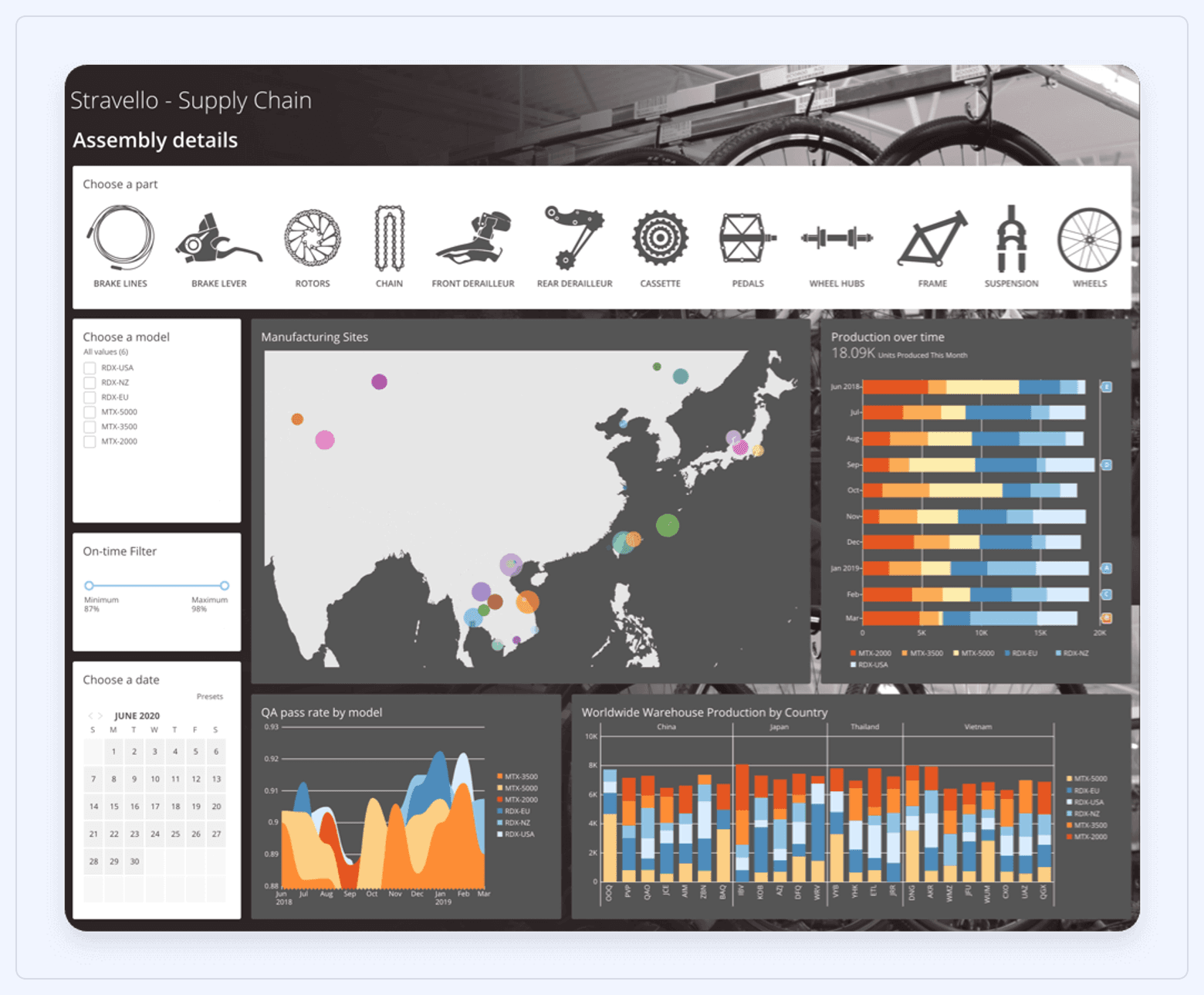
Domo is a cloud-based business intelligence (BI) platform that automatically integrates data from multiple sources, transforms it, and generates insights in real time.
Key features:
- Data integration: Domo provides over 1,000 pre-built connectors, featuring a wide array of data sources, including cloud services, on-premises systems, and proprietary databases.
- Data transformation (Magic ETL): Data can be transformed using a no-code, drag-and-drop ETL or via SQL and scripting for more advanced use cases. This includes operations like joins, filtering, calculated fields, and data type conversions.
- Data visualization: Domo provides a wide range of visualization options, including 150 chart types and 7,000+ custom maps, allowing users to create dynamic, interactive dashboards.
- Custom app development: Domo allows users to build data-driven applications directly on top of the platform using low-code tools or standard development frameworks. These apps can be used to automate processes or deliver interactive interfaces tied to business logic.
- Automation and alerts: Users can set up rule-based alerts and automation workflows tied to data thresholds or events. This allows for proactive responses to performance changes without constant manual monitoring.
Domo pricing
Domo follows a consumption-based pricing model, which means costs are primarily based on the volume of data ingested and processed. All pricing tiers offer unlimited user access and full platform capabilities, including data integration, transformation, visualization, and custom app development.
The platform offers a 30-day free trial that includes full access to the core features.
Funnel
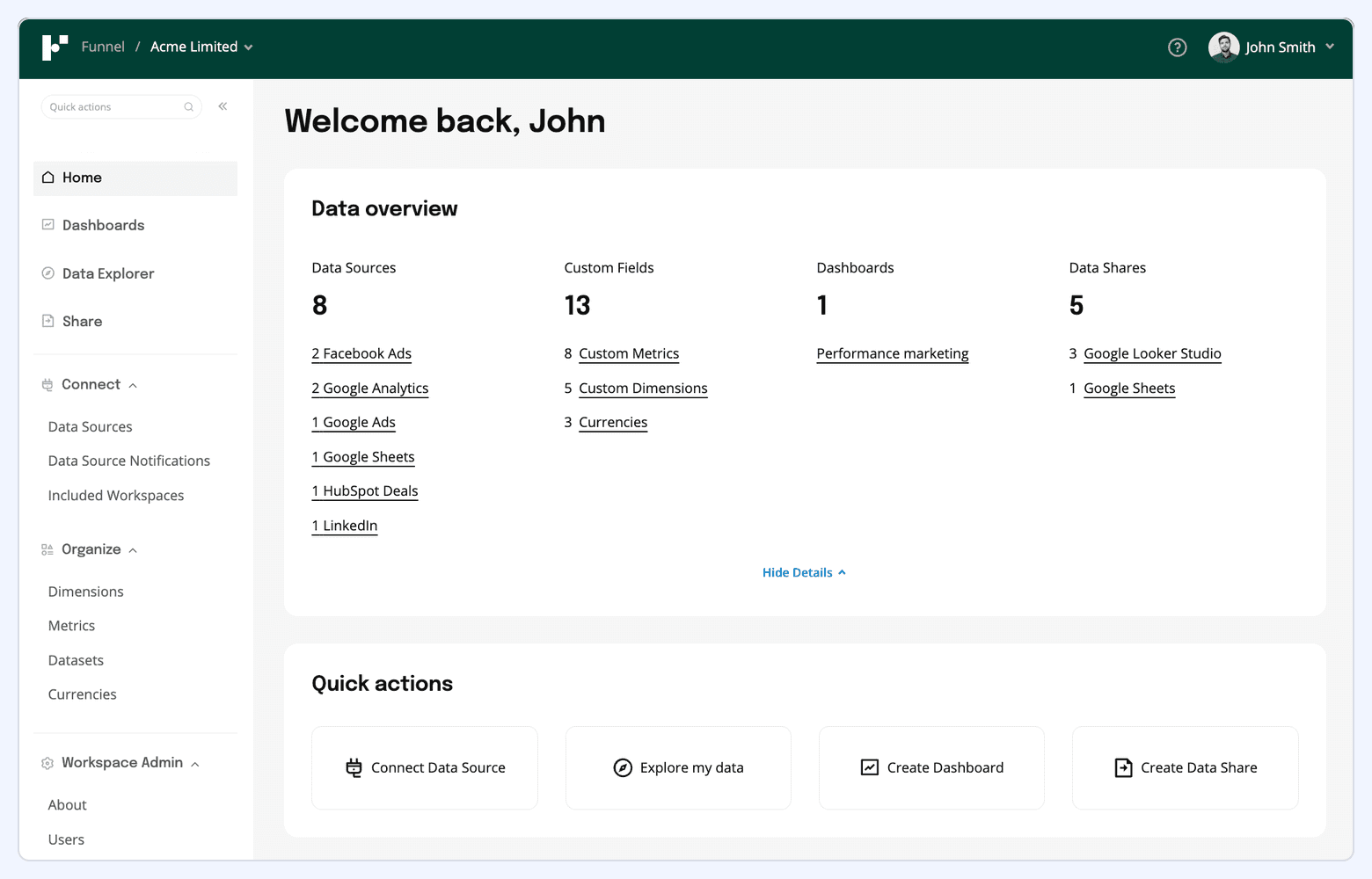
Funnel.io is another popular Adverity alternative. It’s a marketing data platform that enables organizations to collect, process, and analyze data from various marketing and sales channels.
Key features:
- Data integration: Funnel offers over 500 pre-built connectors to integrate data from advertising platforms, social media networks, analytics tools, CRM systems, and e-commerce solutions.
- Data transformation: The platform includes built-in tools for mapping, renaming, categorizing, and aggregating fields across sources. Users can apply rules for currency conversion, campaign naming standardization, and metric normalization to create a unified schema.
- Data storage: All data ingested into Funnel is stored in its internal Data Hub, where it can be queried, filtered, and structured over time. Historical data retention depends on the selected plan.
- Data export: Processed data can be exported to common destinations including Google Sheets, Excel, BigQuery, Snowflake, Amazon S3, Power BI, Tableau, and Looker. Exports can be automated with custom schedules and schema mapping.
- Unified Marketing Measurement (UMM): Funnel provides advanced marketing measurement techniques, including marketing mix modeling (MMM) and multi-touch attribution (MTA). This is separate from the core ETL workflow and requires setup.
Funnel pricing
Funnel uses a modular pricing model based on two components: the selected plan and flexpoints. These points serve as the currency within Funnel's pricing structure, measuring the capacity of a subscription.
There are four plans—Free, Starter, Business, and Enterprise—each offering increasing access to connectors, export options, and governance features. Flexpoints can be scaled up based on the number of data sources, destinations, and volume needs.
Funnel.io reviews mention that the points-based pricing structure can cause costs to escalate quickly, which is of particular concern to marketing agencies.
Adverity Alternatives Comparative Table
Adverity’s Strong But Not So Direct Competitors
Some software solutions share capabilities with Adverity but are not direct competitors, unlike Improvado, Stitch, Domo, and Funnel.
Here are additional Adverity alternatives that might help you achieve your business goals.
Supermetrics
Supermetrics is a marketing data pipeline tool that automates the extraction and delivery of data from over 150 marketing and advertising platforms. It connects to destinations like Google Sheets, Excel, Looker Studio, BigQuery, and Snowflake, making it a lightweight solution for teams focused on automating reporting and basic analytics without building custom infrastructure.
As an Adverity alternative, Supermetrics is better suited for teams that prioritize ease of use and work primarily within spreadsheets. It doesn’t offer native data storage or transformation layers, but it offers fast deployment.
Windsor.ai
Windsor.ai is a marketing data platform focused on multi-touch attribution and performance measurement. It automates the extraction, transformation, and loading (ETL) of data into various destinations such as Google Sheets, Excel, Looker Studio, and data warehouses like BigQuery and Snowflake.
Compared to Adverity, Windsor.ai is more specialized in attribution and real-time performance tracking, while Adverity offers broader data operations. Windsor.ai is often used by teams that want quicker access to cross-channel attribution insights without managing complex infrastructure.
Salesforce Marketing Cloud Intelligence (Formerly Datorama)
Salesforce Marketing Cloud Intelligence, formerly known as Datorama, is a marketing analytics platform designed to unify and analyze data from diverse marketing channels. It offers an extensive library of API connectors, provides data analytics solutions, AI-powered data harmonization and visualization tools.
Compared to Adverity, it places more emphasis on integration within the Salesforce ecosystem and provides stronger native visualization capabilities without relying on external BI tools. It may be a better fit for organizations already using Salesforce products or looking for a solution that combines data integration with built-in dashboards and cross-channel performance insights in one environment.
Fivetran
Fivetran is a cloud-based data movement platform that automates the extraction and loading of data from various sources into data warehouses and lakes.
It offers a wide array of pre-built connectors, enabling seamless synchronization with applications, databases, and services. Designed for efficiency, Fivetran manages schema changes and ensures data accuracy, reducing the need for manual intervention.
In comparison to Adverity, which provides an end-to-end marketing analytics solution with advanced data visualization and analytics capabilities, Fivetran focuses primarily on the ETL (Extract, Transform, Load) process.
Organizations seeking a straightforward, automated data pipeline without the need for built-in analytics may find Fivetran suitable, while those requiring comprehensive marketing data analysis might prefer Adverity or its alternatives.
TapClicks
TapClicks is a marketing operations and reporting tool built for consolidating data from advertising, analytics, and CRM systems into a single interface. It offers out-of-the-box connectors, customizable dashboards, and automated reporting features tailored to agencies and enterprise marketing teams. The platform also includes tools for order management, client approvals, and campaign pacing, making it suitable for managing high-volume media workflows.
Compared to Adverity, TapClicks places a stronger emphasis on client reporting and operational workflows, with built-in modules for media planning and task automation.
Panoply
Panoply is a cloud-based data platform that helps users sync data into a managed data warehouse without the need for extensive technical expertise. The platform includes built-in tools for querying and visualizing data, facilitating quick access to insights.
Compared to Adverity, Panoply provides a more generalized data management solution suitable for various data types beyond marketing.
Organizations seeking a versatile, all-in-one data warehousing and integration platform may find Panoply advantageous, especially when handling diverse data sources and requiring a simplified setup.
Zoho Analytics
Zoho Analytics is a business intelligence and analytics platform designed for teams that need to blend, analyze, and report on data from a wide range of business systems. Users can build dashboards and run custom reports using a drag-and-drop interface, SQL, or AI-powered natural language queries.
Unlike Adverity, Zoho Analytics offers broader BI functionality across departments like finance, sales, and operations. It is more focused on post-integration analytics and visualization, rather than on complex ETL workflows or large-scale data harmonization.
Segment.io
Segment is a customer data platform (CDP) that helps organizations collect, unify, and route first-party data from websites, mobile apps, servers, and cloud applications.
It focuses on real-time event tracking and identity resolution, enabling users to build a clean, centralized view of customer behavior. Segment supports direct integrations with data warehouses, marketing tools, and analytics platforms, making it a central layer in modern data stacks.
Compared to Adverity, Segment is centered around behavioral data and customer event tracking. Teams that need detailed, real-time user interaction data for personalization, attribution, or product analytics may find Segment more aligned with their goals. It’s particularly suited for engineering or data teams building custom data infrastructure around customer journeys.
Exploring Top Adverity Alternatives
Choosing the right data platform depends on the complexity of your marketing ecosystem, the level of control needed over data transformation, and how insights are activated across the organization. While Adverity offers a robust solution for marketing data integration, it’s not the only option—especially for teams that need more flexibility, deeper customization, or a different balance between automation and control.
If you're re-evaluating your data stack or exploring alternatives, Improvado offers a customizable approach to marketing data integration and reporting. To see how it compares in your specific environment, consider scheduling a call to see how Improvado compares in your environment.
FAQ
What are the best Adverity alternatives in 2026?
Top Adverity alternatives in 2026 include Improvado for marketing data integration and intelligence, as well as Domo for broader BI and analytics needs.
Improvado is particularly strong for enterprise-level customization and data governance. The platform offers an advanced data transformation framework, including pre-built data models for common marketing use cases like cross-channel analytics and a no-code, AI-powered interface to build custom transformations.
Is Adverity better than Funnel or Whatagraph?
Adverity offers more advanced data transformation and monitoring than Whatagraph, and greater flexibility than Funnel in data modeling. However, Funnel is more user-friendly for quick deployment, while Improvado often surpasses both in enterprise use cases that require deeper customization and multi-source harmonization.
What features should I look for in an Adverity alternative?
Key features to prioritize include: support for large-scale data integration, automated data normalization, transformation capabilities, customizable reporting, and compatibility with your BI or data warehouse environment. API reliability, governance controls, and service-level flexibility also matter at scale.
Are there more affordable Adverity competitors?
Yes. Funnel, Supermetrics, and Whatagraph offer more affordable entry points, especially for teams with lighter transformation needs or fewer data sources. These tools may trade off depth for ease of use and pricing flexibility.
Do Adverity alternatives support cross-channel marketing reporting?
Most leading alternatives—including Improvado, Funnel, and Supermetrics—support cross-channel marketing reporting. The level of automation, data harmonization, and dashboard customization varies, so it’s important to assess how each platform handles naming conventions, metric mapping, and update frequency.
For instance, Improvado offers a pre-built cross-channel data model and dashboard template. It automatically aggregates data from all relevant sources and harmonizes it before routing it to a dashboard, significantly reducing manual processing.
.png)




.png)
